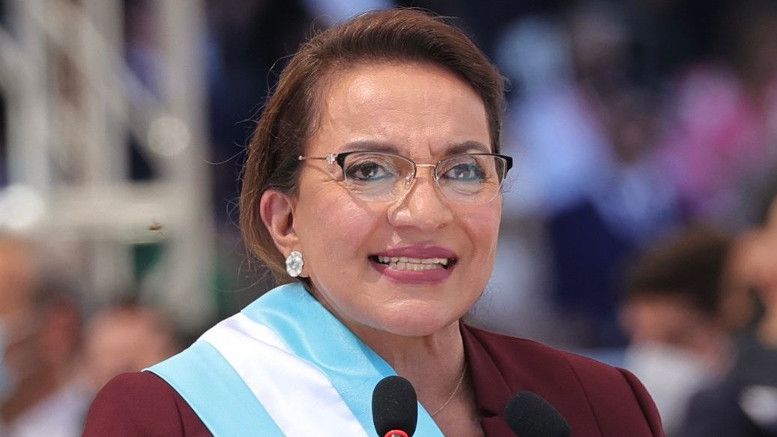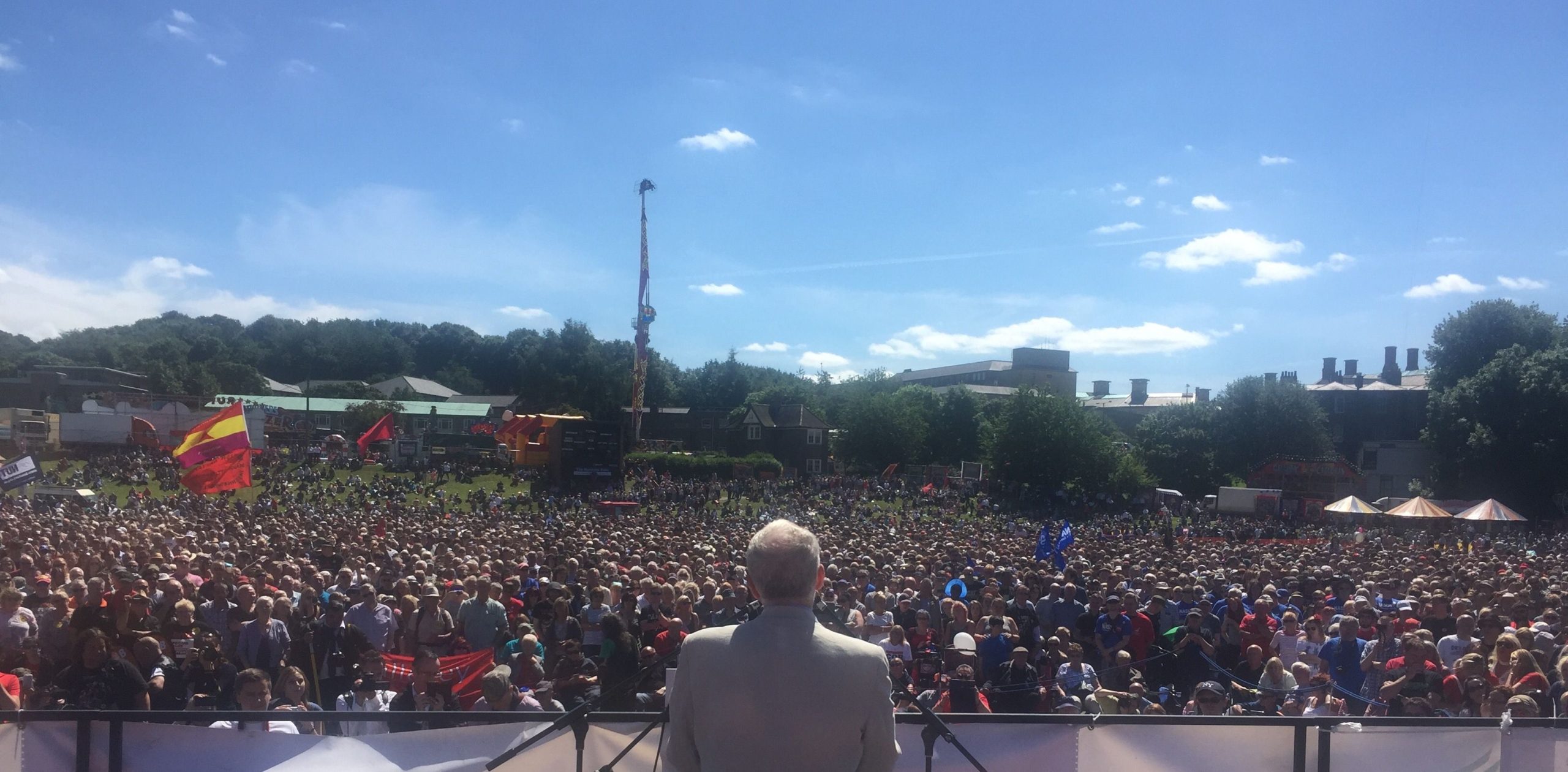Manuel Salmerón Becerra is a member of Alternativa Socialista (ISA in Mexico).
After a long cycle of right-wing regimes, the elections of Xiomara Castro in Honduras and Gabriel Boric in Chile at the end of 2021 appear to be consolidating a new generation of progressive governments in Latin America. The new leaders, both self-described socialists, join several leaders in the region, elected in the last four years, who consider themselves leftists: Andres Manuel Lopez Obrador in Mexico, Alberto Fernandez in Argentina, Luis Arce Catacora in Bolivia and Pedro Castillo in Peru. The Honduran and Chilean elections also share in common the fact that they crown long processes of protests and political and social struggle in their respective countries.
Honduras
Xiomara Castro first entered politics campaigning for her husband, Manuel Zelaya, who was later elected president of Honduras for the 2006 — 2010 term, a term he did not complete. After the 2009 coup d’état, Zelaya went into exile in Costa Rica and Castro took the leadership of the scattered leftist political forces that remained in the country. The former first lady became one of the main leaders of the Frente Nacional de Resistencia Popular (National Front of Popular Resistance) a movement that demanded the restoration of her husband to power and the cessation of military interventions in government affairs. Castro gained sympathy and recognition for the aplomb with which she faced the numerous provocations and threats coming from the military coup perpetrators.
Zelaya returned to Honduras in 2011 and founded the Freedom and Refoundation Party (Libre) around the social base built largely by Xiomara Castro after the coup. Castro herself became the first candidate nominated by the party in the 2012 elections, in which she came in second place after being defeated by Juan Orlando Hernández. Despite her defeat in the presidential elections, Libre positioned itself as the second largest political force in Congress, thus ending the two-party hegemony that had reigned in Honduras since the establishment of democracy in 1982.
Although she triumphed in her party’s internal elections to be a candidate in the 2017 presidential elections, Castro stepped aside in favour of an alliance with the centre-left Innovation and Unity party. The coalition nominated Salvador Nasralla, a well-known TV host, for the presidency, and Xiomara Castro for vice-president. The duo lost by a narrow margin against President Hernández, who was re-elected amidst demonstrations accusing fraud.
Castro launched her third presidential candidacy in January 2020, winning the party’s internal elections in March 2021. Her campaign was characterized by a very toned-down and conciliatory “progressive” discourse that departed from her more radical stances previously. Nevertheless, her connection to the masses and their movements and struggles contrasted with the corruption, repression and looting scandals of the outgoing government of Juan Orlando Hernández. Among other things, Hernández is accused of criminal association, drug trafficking and money laundering (his brother has already been indicted in the US for cocaine smuggling), of hindering investigations into the murder of environmental activist Berta Cáceres in 2016, and of violently repressing demonstrations against his re-election that left 23 dead in 2017. Against this background, Castro’s landslide victory with 51.12% of the vote would have seemed a mere matter of formality had it not been for the convulsive campaign, which left 23 candidates murdered.
Thus, Xiomara Castro is the first woman elected president in the history of Honduras, a country facing severe economic and social problems. With the caravans of migrants that periodically leave San Pedro Sula and the highest femicide rate in Central America among manifold deep problems, Honduras needs a change of direction to counteract the consequences of 12 years of right-wing governments. The question is whether the new president will be able to consolidate and build upon the movement that successfully brought her to power, or whether she will give in to the pressures that the right wing has already begun to exert on her.
The first test came even before she took power: a faction of her own parliamentary group voted against Castro’s proposal to appoint Luis Redondo (of the Savior Party of Honduras, PSH) as head of congress, instead opting for Libre Party member Jorge Cálix. The dissident group, which allied with deputies of the ‘Orlandist’ right wing, was a distorted expression of rank and file discontent in the Left wing ‘Libre’ Party against the pact made by Castro with the populist and pro-capitalist PSH created in 2020 by Nasralla, who is now Castro’s Vice President.
In said agreement, Nasralla agreed not to participate in the presidential elections and to support Castro as long as the vice-president and head of congress came from his party. This legislative conflict was appeased through an agreement in which Cálix and the dissident deputies do not recognize Redondo’s leadership but commit to support the bills sent by the executive branch.
This early conflict clearly has its origins in the reformism of Xiomara Castro and the Libre leadership: instead of relying on their base to openly confront the right wing and the capitalist establishment, they opted to make an alliance with Nasralla to ensure victory. And, of course, the immediate victory was achieved, but at the cost of provoking a split in the movement and, even worse, of pushing one of its factions to confusedly ally itself with the far-right.
Chile
Like in Honduras, the movement that brought Boric to the Chilean presidency was also a long term one: it was born, in the form of student demonstrations, during the first decade of the 2000s. Boric and several of his close collaborators, some of whom are now members of his cabinet, were student leaders in the mobilizations that demanded a profound change in the Chilean educational system. As a legacy of the Pinochet regime, 75% of the country’s schools were in private hands, a situation that limited access to education for a huge number of Chileans. After achieving certain reforms during the 2011 and 2012 protests, Boric, Camila Vallejo and Giorgio Jackson moved from student leadership to the Congressional bench, where they remained for two terms before reportedly thinking of retiring from mainstream politics.
However, with the Chilean social explosion of 2019 their perspectives changed. The new demands, again coming from students in the first instance, focused on the high price of public transportation. Soon after the protests began and in the face of the brutal reaction of the carabineros (the Chilean police riot police) the movement spread and demands were broadened out. Eventually, the protests coalesced into a movement of the whole working class and oppressed layers, demanding the repeal of the current constitution, introduced during the Pinochet dictatorship, and the convening of a constituent assembly to formulate a new one, among other important demands.
Boric and Social Convergence (Convergencia Social), the soft Left party that appointed him as deputy, played a significant role in the victory of the plebiscite for a new constitution. However, the agreement brokered by Boric which brought the plebiscite about, did so by derailing the popular movement, taking it out of the streets and into institutional channels in which the powers of capitalism could operate more freely. From this perspective, Boric and his comrades played a negative role which constituted a betrayal of the working class and oppressed. However, since then and through alliances with other leftist groups, the former student leader began to position himself as a coalition candidate for the Presidency.
Although the more militant sections of the movement warned about Boric’s commitment to the status quo, he beat Communist Party candidate Daniel Jadue in the Approve Dignity (Apruebo Dignidad) primaries (an alliance of the Chilean Communist Party and Boric’s Broad Front, itself a coalition of smaller left parties) Boric then became the left candidate in the 2021 elections. He initially suffered a demoralizing defeat against the far-right José Antonio Kast in the first electoral round. Kast, an avowed Pinochetista, won with 28% of the vote against 26% for the leftist alliance. Despite being a relatively small margin, the setback was surprising after the massive protests of 2019 condemning the behavior of the political class represented by Kast. The above can be explained by the growing moderation of Boric and the entire Broad Front, which no longer vindicated the demands of the 2019 movement in order not to alarm the Chilean right. Finally, threatened by the prospect of having a ruler similar to Jair Bolsonaro, the Chilean masses opted for Boric in the second round in a landslide victory.
A New Pink Tide?
There is no lack of optimists who see in the Honduran and Chilean elections the consolidation of a new “Pink Tide” for Latin America. By this they refer to the left governments that came to power in the first decade of the 21st century, many on the back of explosive struggles.
In the case of Xiomara Castro, her progressive discourse and the mass organization that led her to victory are sources of hope for the second poorest country in the continent. In Boric’s case, he has formed a so-called “new social pact” in Chile, which has brought together different sectors of the left.
But in both cases, we see the limits of reformism. Xiomara Castro, even before starting her government, was betrayed by members of her own party. This is a natural consequence of allying with groups whose interests conflict with those of the working class, which the new president claims to represent.
In Chile, we saw a similar phenomenon in the first round of the elections. In that case, it was evident in the eyes of a significant section of the working class and youth that the pacts that Boric and his party made in order to win the candidacy did not represent the demands of the movement initiated in 2019. The first actions of his government also caused alarm: the recruitment of an economist who during Piñera’s government served as President of the Central Bank of Chile for the Secretariat of Finance and the talk of “reforming” the institution of the “first lady” rather than abolishing it have raised concerns amongst his socialist and feminist supporters.
At a time of world crisis of capitalism such as the one we are living in, the economic conditions do not exist for significant reforms without revolutionary struggle. Even the limited programs of Castro and Boric will have to be won through workers’ mobilization and struggle, and not through negotiation and parliamentarism, paths that both newly elected leaders seem decided to follow. Thus, how long will it take for one or the other ruler to end up associating with the powers that be and betraying the hopes of the masses? How many months will pass before Boric sends for the first time the carabineros to repress a demonstration, or Castro gives in to the interests of the opposition groups?
The working class and the oppressed should not adopt a wait-and-see attitude, but should organize and mobilize. Furthermore, in both cases, the movements that put Castro and Boric in power must recognize the growing urgency to arm themselves with a socialist program that clearly lays out the need to break with capitalism: a rotten system incapable of meeting the most basic needs of humanity and the planet.
How are we going to overcome this system by allying with its defenders? “Compromise” like this is something that only right-wing groups and reactionaries can welcome. The term pink (as opposed to red) tide arose precisely because of the moderation of Latin American left governments in the first part of the 21st century. Their unwillingness to challenge capitalism sewed the seeds for their own downfall and laid the basis for the far-right to grow across the region. Now as we enter a new period of crisis and class struggle it’s clear we need to go further: enough compromise, reformism and alliances with the right! Let a red tide rise up in Latin America!




